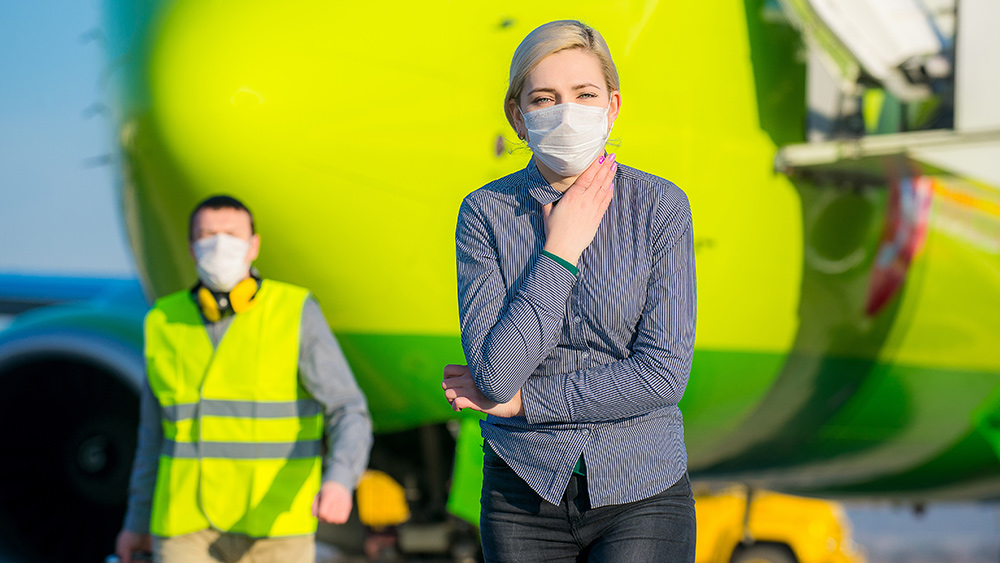Alaska Airlines to require COVID-19 vaccines for all employees, despite record of widespread injury and death caused by vaccines
08/16/2021 / By Cassie B.

Alaska Airlines has announced that its employees will be required to be vaccinated for COVID-19 when the federal government grants full approval to at least one of the currently available vaccines.
The mandate was outlined in a memo sent to staff and puts them in the same category as United Airlines and Hawaiian Airlines. United recently became the first major American carrier to require all of its 67,000 staff to be vaccinated by October 25 or face termination. Their requirement is considered one of the strictest mandates seen so far from an American company and includes employees who have regular interactions with customers, such as gate agents and flight attendants.
Meanwhile, Hawaiian Airlines is giving workers until November 1 to receive their second shot. Exemptions will only be allowed for religious or medical reasons. The low-cost carrier Frontier is giving employees the option to opt out of the vaccine by agreeing to undergo weekly testing.
Southwest Airlines plans to continue encouraging workers to get the vaccine but maintains that there are no plans in the works to require employees to do so. According to an internal memo that was obtained by CNN, CEO Gary Kelly said that although he is concerned about the Delta variant and how it will affect the airline’s operations, nothing has changed in their position on mandates.
Delta Air Lines CEO Ed Bastian said that 75 percent of their workforce has been vaccinated despite a lack of a company-wide mandate. However, they have required all new hires since May to be vaccinated, with United Airlines adopting a similar stance in June.
American Airlines is also not requiring its employees to be vaccinated, but those who do so by the end of the month will be granted an additional day of vacation next year. Their CEO, Doug Parker, said: ‘We certainly encourage it everywhere we can, encourage it for our customers and our employees, but we’re not putting mandates in place.”
Train operator Amtrak has said that it will require 18,000-plus employees to either get the jab or undergo weekly testing. In a memo, Chief Executive William Flynn said: “Many employees have shared reasons why they are apprehensive about getting the COVID-19 vaccine. We understand these concerns and encourage everyone to consult with a medical professional and seek out facts from reputable sources.”
Outside of the transportation sector, companies like Netflix, Microsoft, Tyson Foods, The Washington Post, The New York Times, Disney, Facebook and Google have issued company-wide vaccine mandates. Walmart, meanwhile, is requiring its corporate staff to be vaccinated, but this does not extend to warehouse or store workers at the moment.
Full FDA approval for Pfizer vaccine could come by Labor Day
Right now, the three vaccines that are currently available in the United States have been given authorization under emergency approval only. Moderna and Pfizer have applied for full approval from the FDA, and Pfizer is expected to be given approval by the body by Labor Day. This could give more weight to mandates and will put requirements like those at Alaska Airlines into effect.
Right now, no major airlines are requiring that passengers present proof of vaccination to travel, but there is a federal mandate to wear masks on airplanes.
Despite increasing bias against the unvaccinated by some businesses, some airline industry leaders do not believe travelers will be subjected to vaccine mandates. United Airlines CEO Scott Kirby said that while this may be a requirement for some types of international travel, he does not think that being vaccinated will become a condition to fly domestically. Delta CEO Ed Bastian echoed this sentiment.
Sources for this article include:
Tagged Under: airlines, coercion, covid-19, covid-19 vaccines, employees, health freedom, human rights, informed consent, Liberty, mandates, transportation, vaccine injury, vaccine mandates, vaccines
RECENT NEWS & ARTICLES
VaccineWars.com is a fact-based public education website published by Vaccine Wars Features, LLC.
All content copyright © 2018 by Vaccine Wars Features, LLC.
Contact Us with Tips or Corrections
All trademarks, registered trademarks and servicemarks mentioned on this site are the property of their respective owners.





















